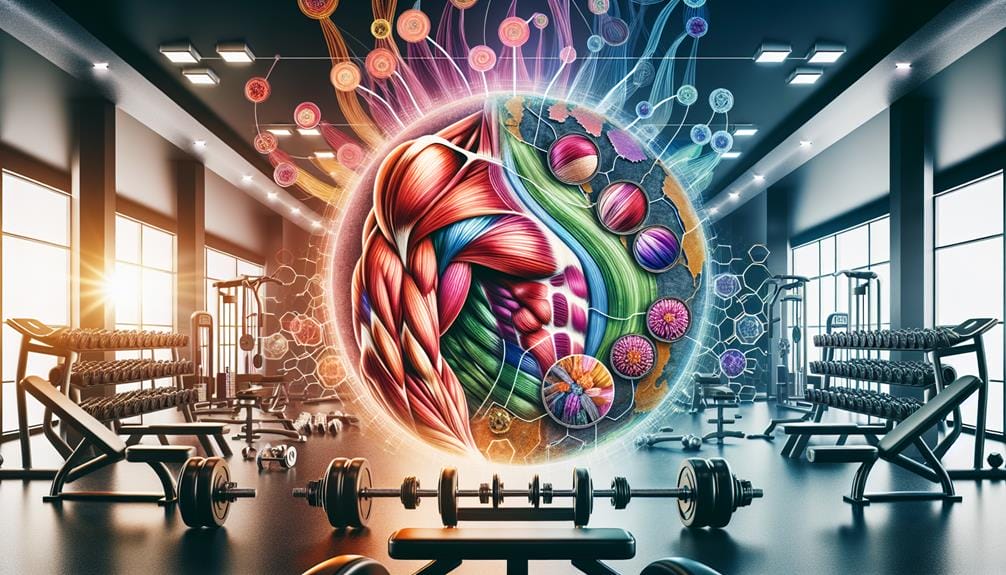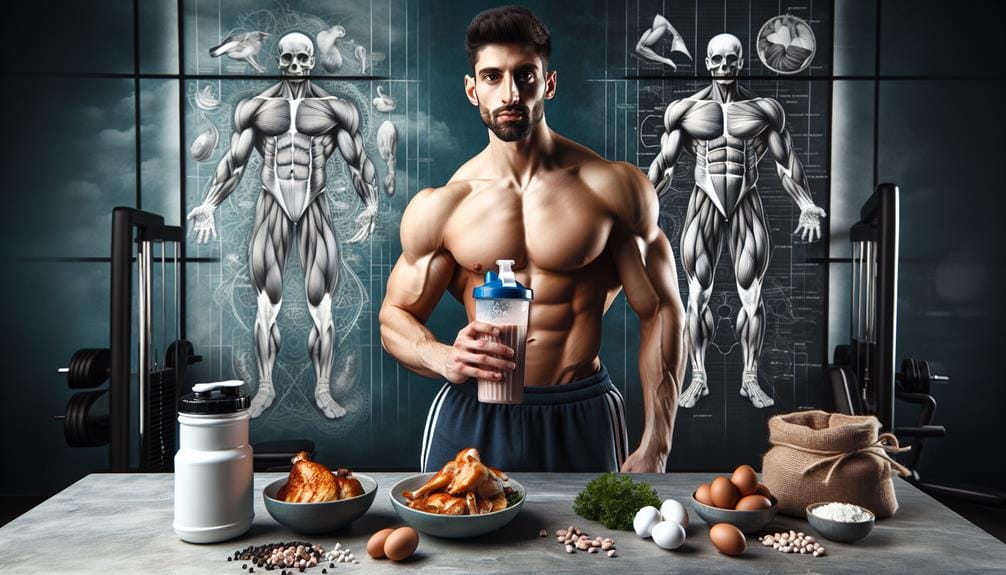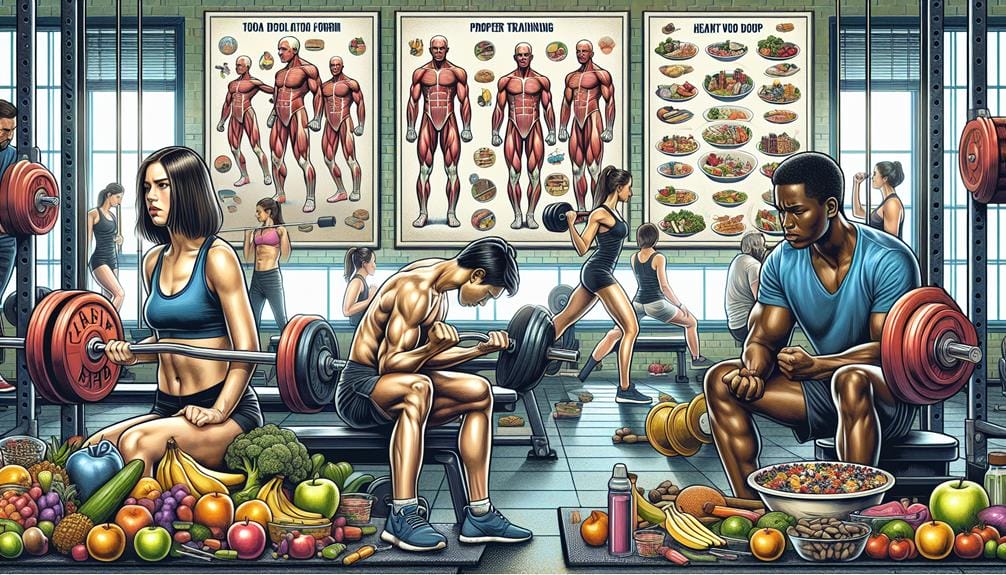To build muscle and get stronger, focus on resistance training, like weightlifting, to challenge your muscles. Aim for progressive overload by gradually increasing weights or reps. Proper nutrition is essential—consume adequate protein from sources like chicken, eggs, and protein shakes to support muscle repair. Balance your diet with carbs for energy and fats for hormone production. Allow muscles time to recover with quality sleep and hydration, which help in muscle repair. Avoid overtraining to prevent injury and listen to your body's signals. Implement these tips into your routine, and you'll notice considerable gains in muscle size and strength.
Key Takeaways
- Prioritize progressive overload by increasing weights, reps, or changing exercises to continually challenge muscles.
- Ensure an adequate protein intake of 20-40g post-workout to support muscle repair and growth.
- Incorporate a mix of compound movements and isolation exercises for comprehensive muscle development.
- Allow sufficient recovery time and quality sleep to promote effective muscle repair and growth.
- Maintain proper form during exercises to prevent injury and maximize workout efficiency.
Benefits of Building Muscle
Building muscle is crucial for maintaining overall health and vitality. Think of muscle training as your secret weapon against aging.
Not only does it boost your strength and functionality, but it also helps fend off conditions like osteoporosis and sarcopenia. These fancy terms are just a way of saying that without muscle building, your bones might turn into crackers and your muscles could shrink like your favorite wool sweater in the dryer.
Strength training isn't just for gym bros; it's for everyone aiming to stay active and healthy. So, grab those dumbbells and start training. Your future self, with sturdy bones and muscles, will thank you for it!
Understanding Muscle Hypertrophy

Muscle hypertrophy, the growth of muscle cells in response to resistance training, is essential for anyone looking to increase muscle size and strength. When you lift weights and push your muscles to their limits, they get tiny tears. Don't worry—those tears are your muscles' way of saying, 'Time to bulk up!'
Here's what you need to know:
- Muscle building: It's all about skeletal muscle hypertrophy.
- Resistance training: Your muscles love a challenge.
- Protein intake: Think of it as muscle food.
- Muscle repair: Those tiny tears need fixing.
- Muscle growth: Get ready to fill out those shirts.
Importance of Resistance Training
Resistance training is essential for anyone looking to enhance muscle hypertrophy, boost their metabolic rate, and improve bone density.
By engaging in activities like weightlifting, you'll not only increase your muscle mass but also support your overall physical health.
Consistent resistance training leads to better muscle definition and helps your body perform more efficiently.
Enhances Muscle Hypertrophy
Engaging in resistance training is essential for stimulating muscle hypertrophy and achieving significant muscle growth. You're not just lifting weights for bragging rights; you're pushing your muscles to their limits, causing those glorious micro-tears that repair and grow bigger and stronger.
Here's why resistance training is your ticket to muscle city:
- Progressive overload: Gradually increasing weight challenges your muscles.
- Muscle size: Targeted exercises sculpt and enlarge muscles.
- Strength training: Boosts overall power and endurance.
- Consistency: Regular workouts lead to continuous growth.
- Variety: Mixing exercises keeps muscles guessing and growing.
Boosts Metabolic Rate
When you incorporate resistance training into your routine, you can greatly enhance your metabolic rate by increasing your muscle mass. Think of it as turning your body into a calorie-burning machine, even when you're binge-watching your favorite show.
Muscle mass demands more energy than fat, raising your resting metabolic rate, which means you'll burn more calories doing absolutely nothing—how cool is that? Regular strength training can boost your resting metabolic rate by up to 7%, making weight management a tad easier.
Plus, the metabolic perks don't clock out when you leave the gym; your muscles keep burning calories for hours after your workout. So, grab those weights and let your muscles do the heavy lifting—literally and metabolically!
Improves Bone Density
Consistently lifting weights can greatly enhance your bone density, making your skeleton stronger and more resilient. By engaging in resistance training, you're putting stress on your bones, which encourages them to grow denser and more robust. This is particularly important for combating osteoporosis and maintaining bone mineral density as you age.
Here's why you should make weight-bearing exercises a regular part of your routine:
- Boosts bone density: Say goodbye to fragile bones!
- Increases skeletal strength: Hulk smash, anyone!
- Reduces osteoporosis risk: Keep those brittle bones at bay!
- Promotes bone health: Your future self will thank you!
- Prevents bone loss: Stay strong for the long haul.
Maximizing Muscle Building

To maximize muscle building, focus on progressive overload by consistently challenging your muscles with increased weights or reps.
Aim for ideal protein intake, roughly 1 gram per pound of body weight, to support muscle growth and repair.
Incorporating these strategies will help you achieve noticeable gains and improved strength.
Progressive Overload Techniques
Progressive overload techniques revolve around steadily increasing workout intensity to push muscle growth to new heights. By consistently upping the resistance, you challenge your muscles, promoting hypertrophy and strength gains. This method prevents your progress from plateauing and guarantees you keep getting stronger and bigger.
Wondering how to do it? Try these:
- Add weight: Increase the amount you lift.
- Increase reps: Do more repetitions of each exercise.
- Boost sets: Add more sets to your routine.
- Shorter rest: Reduce rest time between sets to keep intensity high.
- Switch exercises: Change up your routine to target muscles differently.
Optimal Protein Intake
While escalating your workout intensity is vital, pairing it with the right protein intake is just as necessary for muscle growth. Aim for 1 gram of protein per pound of body weight daily to maximize muscle hypertrophy.
After resistance training, your muscles scream for repair and recovery, so don't leave them hanging! Consuming 20-40 grams of protein post-workout aids in muscle recovery and growth.
Good protein sources include lean meats, fish, eggs, dairy, and plant-based options like legumes and tofu. Remember, proper protein intake, along with resistance training, is your ticket to peak muscle building results.
Effective Workout Strategies

Building muscle efficiently hinges on employing a mix of compound movements and isolation exercises in your workout routine. Weight training is your best friend for muscle growth, and you'll need a blend of strategies to get the job done.
Compound movements hit multiple muscle groups and isolation movements zero in on specific muscles. Don't forget to mix up your repetition ranges for strength training.
Here's a quick guide:
- Squats: The king of compound movements.
- Bench Press: For that chest and triceps glory.
- Deadlifts: Because who doesn't want a strong back.
- Bicep Curls: Hello, isolation movements!
- Leg Press: When squats just aren't enough.
Choosing the Right Exercises

When choosing exercises to build muscle, you'll want to incorporate both compound and isolation movements.
Compound exercises like squats and bench presses engage multiple muscle groups, making them efficient for overall muscle growth.
On the other hand, isolation exercises such as bicep curls focus on specific muscles, helping you enhance definition and achieve balanced development.
Compound Movements Benefits
Incorporating compound movements like squats, deadlifts, bench presses, and pull-ups into your workout routine can greatly enhance muscle growth and overall strength. These exercises maximize muscle growth potential by engaging multiple muscle groups at once, leading to better muscle activation.
They also stimulate the release of growth hormones, promoting muscle hypertrophy and functional fitness. Plus, compound movements make you look like a gym superhero—minus the cape!
Here's why you should love them:
- Boosts muscle growth potential
- Increases muscle activation
- Enhances functional fitness
- Stimulates growth hormones
- Improves overall coordination
Isolation Exercises Importance
Isolation exercises are essential for targeting specific muscle groups and addressing any imbalances or weaknesses in your physique. By including these exercises in your routine, you can provide focused stimulation to specific muscles like biceps and triceps. This approach helps you sculpt and define your muscles, ensuring you look as good as you feel. While compound movements build overall strength, isolation exercises tackle those pesky muscle imbalances.
Here's a quick guide to some effective isolation exercises:
| Muscle Group | Isolation Exercise |
|---|---|
| Biceps | Bicep Curls |
| Triceps | Tricep Extensions |
| Calves | Calf Raises |
| Shoulders | Lateral Raises |
Progressive Overload Techniques

Progressive overload is essential for anyone looking to build muscle effectively. By gradually increasing the weight, reps, or intensity in your strength training, you challenge your muscles to adapt and grow stronger over time. This technique prevents plateaus and guarantees continuous muscle development.
Using a workout journal, you can track your progress and adjust your resistance training accordingly. Here's how you can incorporate progressive overload:
- Add weight: Increase the load by 2.5-5% each week.
- Increase reps: Aim for an extra rep or two each session.
- Boost intensity: Shorten rest periods between sets.
- Vary exercises: Mix up your routine with different movements.
- Enhance volume: Add more sets to your workout.
These steps will help you achieve consistent muscle growth and avoid turning into a gym statue.
Nutrition for Muscle Growth

Understanding nutrition is essential for muscle growth, and it starts with timing your protein intake. Aim to consume protein-rich foods like chicken and eggs throughout the day to fuel muscle repair and growth.
Additionally, balance your diet with the right ratios of carbohydrates and fats to support overall energy and recovery.
Protein Intake Timing
To maximize muscle growth, you should consume 20-40g of protein right after your workout. This timing is essential for muscle repair and hypertrophy. By focusing on protein intake timing, you'll enhance protein synthesis, ensuring your muscles recover and grow effectively post-exercise. Think of it as giving your muscles a VIP pass to the recovery lounge.
Remember these key points:
- 20-40g of protein: Your magic number post-workout.
- Timing matters: Get it in within 30 minutes.
- Spread it out: Don't forget to eat protein throughout the day.
- Muscle repair: Protein helps fix those tiny muscle tears.
- Muscle hypertrophy: Bigger muscles, better flexing.
Essential Macronutrient Ratios
Achieving the right balance of macronutrients—40% protein, 40% carbohydrates, and 20% fats—will greatly enhance your muscle growth and recovery.
Think of it like building a muscle masterpiece: protein is your brick, carbs are the mortar, and fats are the finishing touches.
Aim for 1 gram of protein per pound of body weight daily to keep your muscles happy.
Carbohydrates fuel your workouts and help replenish those glycogen stores post-exercise.
Don't forget about fats; they're essential for hormone production and nutrient absorption.
Balancing these macronutrient ratios optimizes muscle growth, recovery, and overall performance.
Protein Requirements

Consistently aiming for 1 gram of protein per pound of body weight is crucial for muscle growth and recovery. Think of your muscles as little construction workers who need their daily dose of protein to build and repair.
Without it, they're just sitting around, sipping coffee, and chatting about the weather. To meet your protein requirements and guarantee proper muscle hypertrophy, focus on increasing your protein intake.
Here's a handy list to get you started:
- Chicken: The classic muscle-builder.
- Eggs: Nature's protein-packed snack.
- Salmon: For those omega-3 gains.
- Greek Yogurt: Tasty and effective.
- Protein Shakes: Quick and convenient.
Role of Carbohydrates and Fats

Carbohydrates and fats play essential roles in fueling your workouts and supporting muscle growth. Think of carbohydrates as the jet fuel for your engine, providing energy for those intense sessions and aiding in muscle recovery. After your workout, they help replenish your glycogen stores, making sure you're ready for the next round.
Now, let's not forget fats—they're not the enemy! Healthy fats support hormone production, which is vital for muscle growth. Plus, they help absorb those fat-soluble vitamins your body loves.
Balancing carbohydrates and fats in your diet ensures you've got sustained energy for all your muscle-building activities. So, next time you're planning your meals, remember: carbs and fats are your muscle's best friends!
Hydration and Muscle Health
Staying properly hydrated is essential for peak muscle health and enhancing your workout performance. Water does more than just quench your thirst; it fuels your strength and endurance. Here's why you should make hydration a top priority:
- Nutrient delivery: Water helps transport nutrients to your muscles.
- Waste removal: It aids in flushing out toxins and metabolic waste.
- Temperature regulation: Keep cool and avoid overheating during intense workouts.
- Muscle function: Hydrated muscles work better and recover faster.
- Endurance boost: Water helps you power through those grueling gym sessions.
Aim to drink at least 8-10 glasses of water daily. So, grab that water bottle and make your muscles happy!
Importance of Sleep
Getting 7 to 8 hours of quality sleep each night is essential for effective muscle repair and growth.
Think of sleep as your muscle's pit crew, working tirelessly to fine-tune your body. Without it, your dreams of muscle hypertrophy might just remain dreams.
During sleep, your body goes into full recovery mode, fixing those micro-tears from strength training. Plus, adequate sleep boosts muscle growth, making you the Hulk you always wanted to be.
Skipping sleep? You're inviting injury, slow recovery, and stalled progress. So, hit the sack, and let your muscles do their night shift.
Trust me, your future biceps will thank you. And hey, it's a great excuse for an extra hour in bed!
Avoiding Overtraining
After a good night's sleep, it's important to strike a balance in your workouts to avoid overtraining. Pushing too hard can be a recipe for disaster, leading to decreased muscle growth and increased injury risk.
Here's the lowdown on keeping it cool:
- Recovery time: Give those muscles a break!
- Workout intensity: Don't go beast mode every day.
- Proper nutrition: Fuel your gains with the right food.
- Listening to your body: If it's screaming, maybe stop.
- Vary your workouts: Mix it up to keep things fresh.
Ignoring these tips can turn you into a sore, grumpy potato. So, remember, the key to getting stronger and bigger isn't just in the grind, but also in knowing when to chill.
Tracking Progress

Monitoring your progress is essential for ensuring you're making gains and staying on the right path to building muscle. Start by keeping a workout journal to log your weights, sets, and reps. It's like a diary, but instead of secrets, it's full of your awesomeness.
Tracking progress through muscle size measurements and body composition changes will show if you're gaining muscle or just collecting gym selfies. Regularly assess your strength development by checking performance in key lifts like squats, deadlifts, and bench presses.
Common Muscle-Building Mistakes

Many aspiring bodybuilders stumble by overtraining without allowing enough rest, which can hinder muscle growth and lead to fatigue.
To avoid common muscle-building mistakes, keep these in mind:
- Overtraining: Give your muscles time to recover, or you'll end up exhausted, not Hercules.
- Protein consumption: Don't skimp on protein. Your muscles need it to grow and repair.
- Proper form: Forgetting proper form is a fast track to injury. Lift smart, not just heavy.
- Resistance training: Cardio's great, but neglecting resistance training means no muscle gains.
- Progressive overload: If you're not upping the ante with weights or intensity, your muscle development will flatline.
Conclusion
Building muscle might seem challenging, but with the right approach, it's entirely achievable. Prioritize resistance training, make sure to get enough sleep, and avoid overtraining.
Some might think they don't have enough time, but even short, focused workouts can yield significant results. Track your progress and stay consistent.
Remember, the key is a balanced, well-structured routine. By following these tips, you'll get stronger and bigger, transforming your fitness journey into a rewarding experience.









Leave a Comment